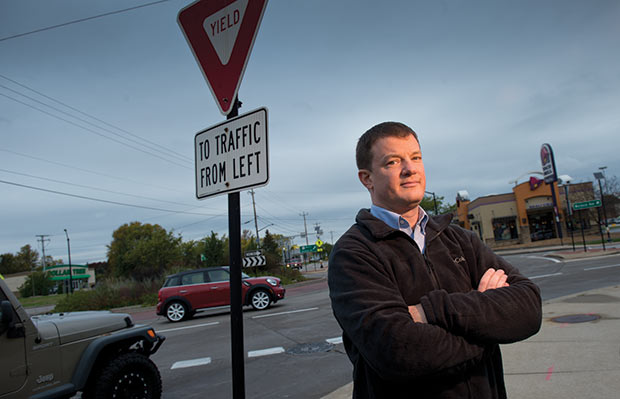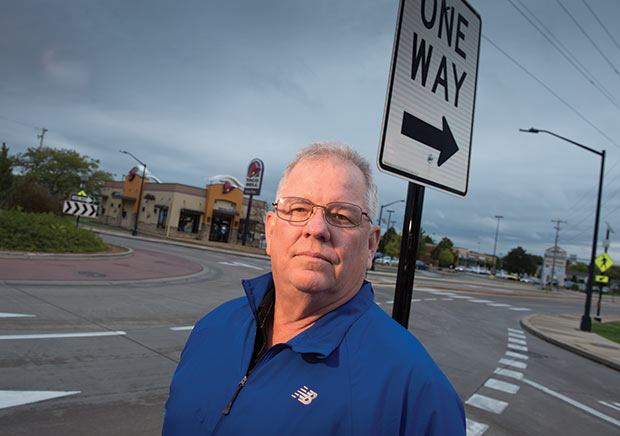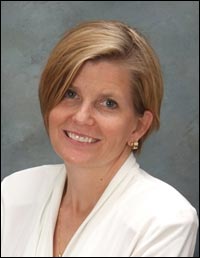City, property owner to face off before high court over roundabout assessment
By: Erika Strebel, [email protected]//October 26, 2017//
City, property owner to face off before high court over roundabout assessment
By: Erika Strebel, [email protected]//October 26, 2017//

Should a landowner have to pay extra taxes for a nearby public project even though it has had no effect on the value of his property?
For the appellant in a case up for oral arguments before the Wisconsin Supreme Court next week, that’s the main question.
Central to the case are both a $4 million roundabout built in the late 2000s at the intersection of Jackson Street and Murdock Avenue in Oshkosh and the resulting “special assessment” of more than $40,000 that local officials have asked an abutting land owner, CED Properties, to pay for related improvements to his property.
The roundabout is nestled amidst several businesses. Closest to the intersection are a Mobil gas station, a Walgreens, a Taco Bell restaurant and a vacant lot that was once occupied by a Kentucky Fried Chicken.
The city, using its powers of eminent domain, bought the KFC and had it knocked down to make room for the project. The city also ended up taking 3,799 square feet of CED’s 41,871-square-foot property at the northwest corner of the intersection, where the Taco Bell stands. The two parties litigated the compensation for the taking and eventually agreed that the city should pay CED $180,000 for the land.
This is not the CED’s first trip to the state Supreme Court over the project. The company took the city to Wisconsin’s high court about four years ago in what ultimately proved a successful challenge of the procedures the city had used in trying to charge a special assessment for the project. The city ultimately reassessed the property, and CED once again filed a legal challenge.

CED is now contending that the city had neglected its statutory obligation to bring up in eminent-domain proceedings any improvements that might lead to a special assessment. For that reason, the company argues, the city should not have been able to impose a $40,000 on CED. CED is also arguing that the project conferred none of the sort of so-called special benefits that would warrant a special assessment in the first place.
According to the state’s eminent-domain statutes, when a public project is likely to increase the value of private property, any question concerning special benefits must be brought up in eminent-domain proceedings. Under the state’s special-assessment statutes, municipalities may charge abutting property owners a special assessment if a project results in special benefits that increase the property’s value or increases services to those property owners.
To bolster its argument that it had received no special benefits, CED made use of an affidavit submitted by J.C. Johnson, of J.C. Appraisal in Cottage Grove. Johnson, a 20-year veteran of the state Department of Transportation who used to be an access expert and litigation coordinator, contended that the roundabout in question had harmed CED by, among other things, allowing traffic to speed up near its property.
Johnson said he has found over the years that business owners usually want traffic to stop or slow down near their properties so that drivers have time to consider whether they might, say, want to take a quick trip through the drive-thru at a fast-food restaurant before making their way through an intersection.
But that’s not happening at the roundabout at Murdock Avenue and Jackson Street.
“Putting a roundabout by this many businesses is not an improvement,” Johnson said. “It’s not a special benefit. It’s nothing.”
The dispute has so far been an uphill battle for CED, which is being represented pro bono by Erik Olsen of Eminent Domain Services, Madison.
When the case was in Winnebago County Circuit Court in 2016, Judge John Jorgenson sided with the city and its representative, Richard Carlson of Silton Seifert Carlson, Appleton. CED appealed, and the District II Court of Appeals affirmed Jorgenson in January.
The appeals court contended that the phrase “special benefits” is defined differently in the state’s eminent-domain statutes than in its special-assessment statutes. It went on to find that, within the context of the special-assessment laws, CED had indeed received special benefits from the roundabout.
It also agreed that the testimony from CED’s appraiser about the roundabout’s adverse effects on the Taco Bell was not enough to show that CED might not have gained some special benefit from the project.
Judge Mark Gundrum dissented, arguing that CED and its appraiser had succeeded in casting doubt on whether there had been any sort of special benefit.
CED filed a petition for review in March, and the justices voted to accept the case in May.
The city, in calling on the high court to affirm the lower courts’ decisions, is contending that the roundabout conferred special benefits by adding to the types of services that CED receives at its property. These new “services,” the city contends, included new curbs and gutters and landscaping, as well as better access, and safer and shorter travel times for customers, delivery drivers and employees.
Carlson said there’s nothing unusual about how the city levied the special assessment in this case.
“CED is claiming that what we’re trying to do is claw back some of the $180,000 back, but we say the condemnation was an apple and the special assessment was an orange,” he said. “What we’re saying is that this is basically a run of the mill, routine special assessment that municipalities have been doing for 75 years.”
Olsen said that if the justices find that the appeals court is correct, local governments would gain much more power to tax landowners for abutting public projects. Businesses, he warned, could find themselves being made to pay for public projects that provide little direct benefit to private owners.
He said special assessments are rarely challenged in court because the cost of hiring an attorney is often greater than the assessment bills themselves. Property owners also have a short window of time – 90 days – to challenge assessments.
“If (cities) can call a roundabout services, they can call anything services,” Olsen said. “So basically they can send anybody a tax bill so long as the property abuts a public project.”
Next up
Besides CED Properties’ dispute on roundabouts and special assessments, these criminal appeals involving sexually violent people who are committed under Chapter 980 are scheduled for oral arguments before the Wisconsin Supreme Court on Wednesday:
9:45 a.m.
State v. David Hager, Jr.: The high court is being asked to weigh in on whether circuit courts, in light of a law enacted in 2013, can compare newly offered evidence with evidence already in the record and admitted by the state to determine whether to grant a discharge trial.
1:45
State v. Howard Carter: The justices are expected to find answers to these questions: Was a committed person improperly denied a discharge because the above-mentioned law from 2013 did not apply and his counsel was ineffective? Or conversely, if that law did apply, was the court of appeals’ interpretation in State v. Hager applied and, if so, should the petitioner have gotten a discharge hearing? Finally, if the law from 2013 was applied correctly, did it unconstitutionally restrict those committed under Chapter 980 from accessing the court to end their commitment?
—SOURCE: Wisconsin Court System website
Legal News
- Former law enforcement praise state’s response brief in Steven Avery case
- Eric Toney announces re-election bid for Fond du Lac County District Attorney
- Former Wisconsin Democratic Rep. Peter Barca announces new bid for Congress
- Republicans file lawsuit challenging Evers’s partial vetoes to literacy bill
- More human remains believed those of missing woman wash up on Milwaukee Co. beach
- Vice President Harris returning to Wisconsin for third visit this year
- Wisconsin joins Feds, dozens of states to hold airlines accountable for bad behavior
- Trump ahead of Biden in new Marquette poll
- Bankruptcy court approves Milwaukee Marriott Downtown ‘business as usual’ motion
- New Crime Gun Intelligence Center to launch in Chicago
- Arrest warrant proposed for Minocqua Brewing owner who filed Lawsuit against Town of Minocqua
- Wisconsin Supreme Court justices question how much power Legislature should have
WLJ People
- Power 30 Personal Injury Attorneys – Russell Nicolet
- Power 30 Personal Injury Attorneys – Benjamin Nicolet
- Power 30 Personal Injury Attorneys – Dustin T. Woehl
- Power 30 Personal Injury Attorneys – Katherine Metzger
- Power 30 Personal Injury Attorneys – Joseph Ryan
- Power 30 Personal Injury Attorneys – James M. Ryan
- Power 30 Personal Injury Attorneys – Dana Wachs
- Power 30 Personal Injury Attorneys – Mark L. Thomsen
- Power 30 Personal Injury Attorneys – Matthew Lein
- Power 30 Personal Injury Attorneys – Jeffrey A. Pitman
- Power 30 Personal Injury Attorneys – William Pemberton
- Power 30 Personal Injury Attorneys – Howard S. Sicula








